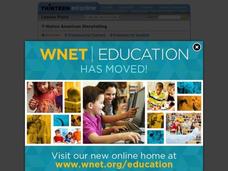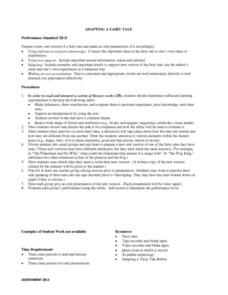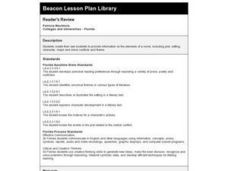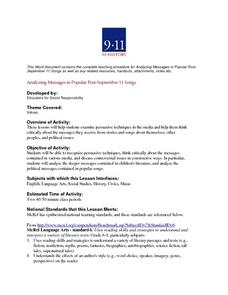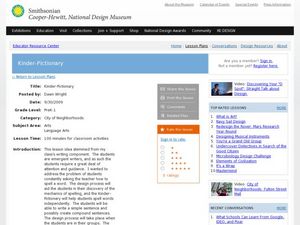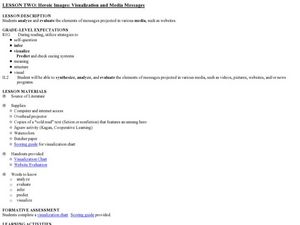Curated OER
Parts of Speech: Active Verbs
Students use White Fang to help them study active verbs. In this grammar lesson, students define active verbs and find examples in the the novel White Fang. Students then use ProQuest to research a place they'd like to visit. Students...
Curated OER
How Logical is Garfield?
Third graders analyze comics found in the newspaper for samples of logical, emotional, and ethical appeal. They write a paragraph for each selected comic strip explaining how the comic strip represents the use of logic, emotions, or ethics.
Curated OER
Comparing Characters Across Two Short Stories
Ninth graders listen to a read aloud of two short stories focusing on literary devices. The write about the settings and realism of the stories, and decide each main character handles the conflict he faces with nature.
Curated OER
Native American Legends
Students work together in groups to research a Native American legend. They present the information they gathered in a format they chose. They write their own legend based on their research.
Curated OER
Adapting a Fairy Tale
Students read and prepare a new oral version of a selected fairy tale. They read and compare/contrast two fairy tales and identify the main story elements. In small groups they create a new oral version of one they fairy tales and...
Curated OER
Why is Reading Important?
Ninth graders discuss why reading is an important skill for them to use in their lives. In groups, they examine the problems someone might have out in the world if they are illiterate. They practice reading in ways that it makes it fun...
Curated OER
The Best Thing
Young scholars participate in a literature lesson while reading the children's book "The Best Thing". The teacher uses the method of guided reading while helping students with reading comprehension skills. Young scholars answer...
Curated OER
I Make Clay Pots
Students read a book entitled, "I Make Clay Plots." After observing the cover, students predict what they believe will happen in the story. They review sight words and discuss methods of decoding unfamiliar words. Students answer...
Curated OER
Living in an Igloo
Second graders read a book entitled, "Living in an Igloo." After observing the book, 2nd graders predict what will happen in the story. They explore the steps in building an igloo. Students review strategies they can use to decode...
Curated OER
I Know an Old Lady Who Swallowed a Pie
Students listen to the story I Know an Old Lady Who Swallowed a Pie. They predict what will happen next as they listen to the story. They sequence pictures and words to desribe a story.
Curated OER
Louisiana Cinquains
Students enhance their understanding of parts of speech by writing a cinquain poem about Louisiana. In this cinquain poem lesson, students read example cinquain poems and study the format for a cinquain poem. Students create a class poem...
Curated OER
Learning the Component and Information Found in the Newspaper
Fifth graders work in a group to identify and reference the index, front page, metro page, state and local pages, as well as the sports, comics and classifieds in the newspaper 90% of the time during the game of "Identifying and...
Curated OER
Reader's Review
Students create booklets to provide information on elements of a novel, including plot, setting, character, major and minor conflicts and theme.
Curated OER
Night by Elie Weisel
Students read "No News from Auschwitz" and answer the study questions as an introduction to the novel. They record reactions to the essay and compare with reactions after reading "Night".
Curated OER
Nursery Rhymes
Students recall details of nursery rhyme read by teacher, identify main characters, and demonstrate knowledge of poem by creating concept map about story that includes title, clip art, and changes in font and color.
Curated OER
911 As History
Middle schoolers recognize persuasive techniques, think criticaly about the messages contained in various media, and discuss controversial issues in constructive ways. They analyze the deeper messages contained in children's literature,...
Curated OER
Library Lesson Plan: Table of Contents
Third graders create a table of contents. In this library skills activity, 3rd graders read Welcome to the White House and use the provided worksheet to create a table of contents for the book.
Curated OER
The Play's the Thing: The Drama of Cyrano de Bergerac
Students practice dramatic 'living' through various drama activities. In this drama lesson, students define drama, view examples of dramatic elements in Cyrano de Bergerac and Roxanne, define characterization within the dramas, study the...
Curated OER
Adventures in Alice
Young scholars create a haiku and illustrate it on the computer. In this haiku lesson plan, students review the history of the haiku while they are outside and then write their own. Young scholars then use a computer program to...
Curated OER
Kinder-Pictionary
Students create their own dictionary. In this spelling lesson, students make a dictionary with just words and pictures. They use these dictionaries when they are writing to remember how to spell words.
Curated OER
Heroic Images: Visualization and Media Messages
Young scholars examine media messages. In this media awareness lesson, students analyze online messages about heroism as they complete a jigsaw reading activity.
Curated OER
I Hate My Sibling?
Third graders read the book Jacob Have I Loved, then ask themselves whether they can truly hate their siblings.
Curated OER
The Human Jigsaw
Fourth graders, using Thomas Paine's "The Crisis, No. 1" from The American Crisis, form a human jigsaw.
Curated OER
Forms of Poetry
Students identify distinguishing features of poetry. They identify and use literary terminology including symbol, theme, simile, and alliteration. They recognize the effects of language.
Other popular searches
- Nonfiction Text Features
- Nonfiction Text Structures
- Types of Nonfiction Text
- Features of Nonfiction Text
- Fiction and Nonfiction Text
- Nonfiction Text Elements
- Infer Nonfiction Text
- Parts of Nonfiction Text
- Summarizing Nonfiction Texts
- 6 Nonfiction Text Structure
- Inquiry and Nonfiction Text
- Reading Nonfiction Text





